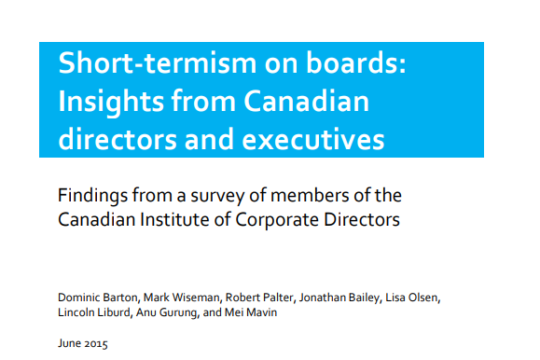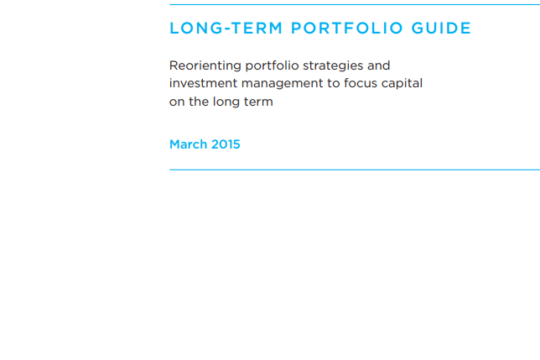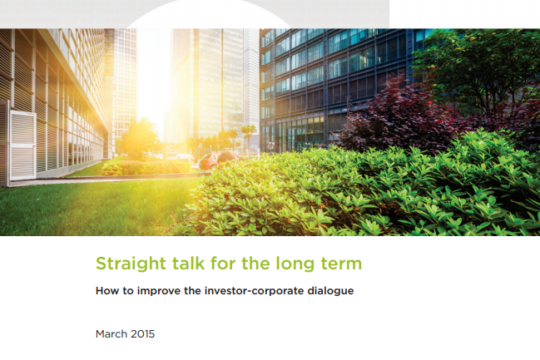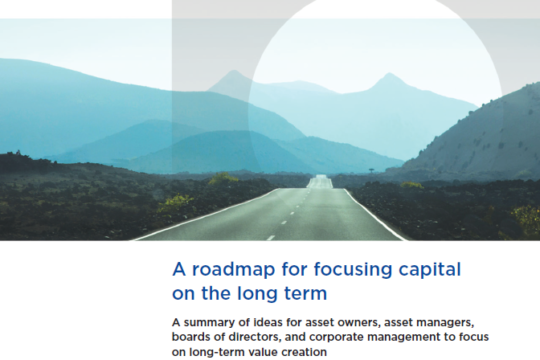
Article
21 January 2016 - In FCLT’s March 2015 publication ‘The Long-Term Portfolio Guide‘, we argued that while progress has been made in the last few years with the creation of non-traditional indexes that are not solely focused on market capitalization, more could be done to design and utilize benchmarks that foster a longer-term orientation. If widely adopted by asset owners and managers, such benchmarks may well have the power to influence boards and management at investee companies, resulting in more efficient deployment of corporate strategies and capital aimed at...

In the News
21 January 2016 - “Absolutely it’s a buying opportunity, when the world is panicking and you have a quintessentially long-term view,” Mark Wiseman, the chief executive officer of Canada Pension Plan Investment Board, said in an interview at the World Economic Forum. “Whatever negative market sentiment there is, I don’t believe is supported by the facts that are coming out.”

In the News
21 January 2016 - Canada Pension Plan Investment Board has teamed up with S&P Dow Jones Indices to track businesses with the potential to deliver returns over the long haul, with the ambitious plan to influence other companies to adopt better governance and business practices. Several institutions have signed on to invest in the new S&P Long-Term Value Creation Global Index, and CPPIB expects retail investors will soon gain access through funds.

In the News
21 January 2016 - A group of large global investors hopes a new stock index will prove that companies with good governance and focused on long-term goals will produce higher returns for shareholders. Six global pension plans and sovereign-wealth funds debuted the S&P Long-Term Value Creation Global Index at the World Economic Forum in Davos, Switzerland, on Thursday, an index they said represents companies that can be role models for others.

In the News
21 January 2016 - The S&P Long-Term Value Creation (LTVC) Global Index comprises firms that have, according to the index provider, a proven ability to manage the long-term economic and governance opportunities in the market, based on analysis provided by RobecoSAM. The creation of the index was recommended as part of the Focusing Capital on the Long Term Initiative (FCLT), founded by the Canada Pension Plan Investment Board (CPPIB) and consultancy McKinsey in 2013.

Article
18 September 2015 - A group of corporate and investment leaders convened in Santiago, São Paulo, and Singapore to discuss the roadmap for focusing capital on the long term, identify how short-termism manifests itself in particular economies and solicit ideas for how local businesses and investors can enhance their long-term focus. The sessions in Santiago and São Paulo were co-hosted by CPPIB and McKinsey & Co, with CPPIB and GIC acting as co-hosts for the session in Singapore. Key highlights from these round-tables include: Short-termism is an issue with broad relevance: Participants challenged...

Governance | Report
5 June 2015 - Canadian directors believe they have a responsibility to address short‐termism. Many believe there are specific actions they should be taking on their respective boards. Such are the results of a recent survey of the members of the Institute of Corporate Directors (ICD). In June 2015, Dominic Barton and Mark Wiseman, Global Managing Director of McKinsey and President and CEO of Canada Pension Plan Investment Board (CPPIB) respectively, delivered a well‐received keynote address based on the findings of their HBR article Where Boards Fall Short. The address...

Report
23 March 2015 - In a recent survey of public and private pension plans and sovereign-wealth fund managers, respondents overwhelmingly agreed that while the ability to invest long term is an advantage, they do not necessarily have an effective set of implementation strategies/tools to help them realize their aspirations to be long term.

Investor-Corporate Engagement | Report
16 March 2015 - Short-term behavior is becoming the norm in modern capital markets. Rather than pursuing and communicating long-term strategies, many public companies dedicate significant resources to meeting quarterly earnings guidance and communicating their performance relative to this guidance. This focus on short-term actions and communications seems counterproductive, considering that more than 50% of a typical company’s value is created by activities that will take place three or more years in the future. Research shows that the current emphasis on achieving short-term earnings targets leads to value destroying behaviours: One...

Article
10 March 2015 - On March 10, 2015 more than 120 senior global leaders from all parts of the investment value chain, including asset owners, asset managers, corporate boards, management and policymakers, gathered at the Long-Term Value Summit in New York. The Summit program was designed to take leaders on a journey: first reflecting on their personal roles as leaders; then examining the various challenges and actions that their respective link in the value chain must take; and, finally coming together to understand how true system-wide change can be effected. The...

Report
10 March 2015 - Insights from FCLT's Long-Term Value Summit, where more than 120 senior global leaders from all parts of the investment value chain, including asset owners, asset managers, corporate boards and management, met in New York in March 2015.

Report
1 March 2015 - Asset owners, asset managers, corporate directors, and managers have the ability to unlock system-wide change, yet today too many of these individuals are the source of short-term pressure. An ideal market will always include a mix of investors with different investment time horizons and investment strategies. Time horizons will always vary by industry and asset type. Yet, across industries, long-term thinking goes beyond a product cycle, beyond the average tenure of directors or the CEO, and beyond a typical investment cycle. If the major players...